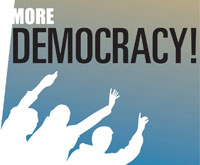Should People in Democratic Glass Houses Throw Stones?
By Patrick Basham

The neoconservative call to ostracise
The trouble is that post-Communist
Consequently, asking in the wake of
The Bush administration needs to avoid a holier-than-thou attitude in these matters. Unless and until the
One observes, for example, the Bush administration’s marked impatience with the pace of Russian democratisation. Yet, it continues to exhibit tremendous patience with democratisation’s meandering (to put it charitably) pace in countries such as
Economic development is the catalyst for
The larger irony is that the world’s greatest liberal democracy is itself becoming increasingly illiberal. Both domestically and internationally, there is a need to refocus on a broader definition of democracy than American politicians are comfortable employing in public, especially when lecturing their Russian counterparts.
In practice, a myriad of economic and personal freedoms form integral pillars of a strong and stable liberal democracy. Simply put, political freedom is not sustainable without the foundations supplied by economic and personal freedom.
Yet, American liberal democracy is in the process of being replaced by a bully-like
Here, one witnesses the rise of highly coercive, arguably fascistic, policies to control individual choices and restrict personal freedom over, for example, one’s diet and the consumption of a list of still-legal products, such as alcohol and tobacco.
More worrisome, perhaps, is the fact that U.S.-led international health and environmental organisations are initiating pseudo-scientific campaigns upon those middle-income countries with allegedly indulgent energy, and dangerous personal, consumption habits.
There are no prizes for guessing which former Eastern European superpower has been chosen as the World Health Organisation and the Intergovernmental Panel on Climate Change’s next big juicy target. The Russians knowthis and, consequently, are circling the diplomatic wagons.
Going forward, the
Unlike the cartoonish rhetoric of recent days, the American critique of Russian behavior should be informed and it should be candid. Above all, it should be constructive, if
The Russians do not think the
Absent a belated U-turn, American foreign policy – conducted by those living in an democratic glass house – will continue to throw ever-larger political stones in
Patrick Basham is director of the Democracy Institute in
Subscribe to Pravda.Ru Telegram channel, Facebook, RSS!


